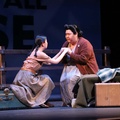Part 3 >>
On the evening of December 7, 1941, Amano recalled ordering his two Panamanian maids to bring whiskey and three glasses. He poured for the three of them and offered a toast to Japan’s victory and a toast to his love of Panama. On impulse, he grabbed the Japanese board game, go, before taking a last look at the home that held happy memories of his family and driving to the police station.
Amano revealed his conflicted emotions:
At last, Japan started the war. Do you think Japan would win? I had a cold doubt stab at my heart. I was sure Japan would win. Japan had to win. I had to tell myself that. But, I knew America is a big country. Very sharp. Latest technology. Modern country. Not like Japan. Now, Japan is so tired and run down from war with China. On the other hand, the Japanese people always are prepared. Strong military. Not like the “chocolate soldiers” of America. Millions of soldiers will unite against America. However, I can’t believe Japan will win. I’m optimistic and pessimistic by waves. Like ornamental fish circling in a lantern. If the Great God can see the future and if he said Japan would win, I’d give my life right this moment and not regret it one bit.
At first, the life of a Balboa inmate was filled with exhausting physical labor and stingy rations that forced the hungry prisoners to devise ways to cheat the system for second helpings. Amano believed that reports of American prisoners being well treated in Japan prompted the U.S. military to improve conditions at Balboa. With reduced physical demands and more generous food rations, the prisoners began to look for ways to entertain themselves in the evening.
A lecturer by vocation and disposition, Amano acquainted the prisoners with astronomy and the histories of ancient Greece, England and France. He recited stories from A Tale of Two Cities and The Man in the Iron Mask although audience favorites were usually the tales of heroes from ancient Japan. Amano realized, however, that what the prisoners truly craved was real news and he set out to procure it.
The improvement in working conditions meant some prisoners were assigned to cleaning duties at a nearby military hospital. Those jobs offered occasional contact with local Panamanian laborers. Amano developed a relationship with the locals, helping out as an interpreter and distributing a few tips, a practice he did not describe as offering a bribe. After a few days, he called in a favor by asking for issues of the Panama American and the Estrella, the local English language and Spanish language newspapers. One of the workers, identified only as a black man named “E,” smuggled papers to Amano.
Amano read the newspapers and formally delivered a synopsis to the other prisoners in Japanese from a makeshift stage. The guards could not understand him and demanded to know what was he was telling the audience. Amano replied that he was preaching religion but the soldiers became suspicious after picking out words like “Manila” and “Singapore.” Later, Amano heard rumors that Officer Sibbly would “not tolerate” the troublemaker. Drawing his own conclusion about Sibbly’s intentions, Amano “wondered if someone could be killed over such a trivial reason. Killing should be reserved for a more serious crime. I decided to continue. People wanted the news so badly. At the time, the decision was easy but looking back, it was foolhardy.”
The nightly news roundup became a highly anticipated event and the prisoners began betting on the distance of the Japanese army’s daily advance. Amano sifted through reports from the American perspective for any favorable messages, skeptical that Allied losses would be admitted. If the papers mentioned a high number of Japanese army casualties, he concluded that the Americans must have suffered a defeat. A carefully phrased report that the U.S. military “chose” to retreat because a position was not worth holding must have concealed a Japanese victory. According to Amano, one had to read between the lines.
Using the information gleaned from western news sources, Amano wrote at length in Waga Toraware No Ki about the bravery, cunning and superiority of the Japanese in the battles of Bataan, Coregidor and Surabaya. Germany, England and the United States were all fair game for criticism. Regarding the sinking of the British battleships Repulse and Prince of Wales, he bragged, “for Germany, it took two years to bomb England, but Japan accomplished this destruction in 80 minutes.” Furthermore, England’s war planners relied on “military academy textbook” strategies while the American forces failed to anticipate attacks from Japanese soldiers who “came down from the jungles like a strong wind.” The “overnight” popularity of General MacArthur confirmed how biased reporting easily swayed the American public. Amano contrasted the deficiencies of westerners with numerous examples of Japanese resourcefulness and sacrifice.
Sometimes the enemy commanded grudging respect. Amano admired British Royal Navy Admiral Thomas Phillips for waving off aid and going down with his flagship, the Prince of Wales. He surmised, “a Japanese ship came alongside during the attempted rescue but did not try to shoot the sailors in the water because they believed in the “bushido,” the “samurai” way. Amano also commended the bravery of the British soldiers and wondered why U.S. reports were so critical of their ally.
Following the evening news summary, the prisoners organized another diversion that especially nourished Japanese identity. The men constructed a sumo ring for wrestling matches, complete with announcers, referees, east and west teams and weight divisions. Competitors chose stage names and wore makeshift kesho mawashi, the traditional sumo garb. When the American soldiers took an interest in the matches and began to place bets, the prisoners quit, unwilling to provide entertainment for their captors. The soldiers requested judo matches but the prisoners ended the demonstrations after a few sessions for the same reason.
Resistance took many forms in the Balboa prison: privately held thoughts, passive resistance (pretending not to understand English), angry denunciations, overt demonstrations. As the weeks dragged on, Amano had ample opportunity to size up the enemy:
I thought Americans were better than us but I corrected that notion very quickly. I used to associate with high quality, educated American gentlemen. But since coming to this camp, my only exposure was to soldiers. I saw, through the soldiers, the real America. They are not as neat and sharp as I’d thought. Every time we heard about Japanese victories, we all thought about the Americans the same way. Some people started to use Japanese instead of English to communicate with the soldiers, failing to make an effort anymore. Soon, we lost respect for the American soldiers.
Amano criticized the bumbling military method of counting off by fours that resulted in a different prisoner count almost every day. He wondered how soldiers equipped with the highest quality tools could turn out such shabbily constructed tent foundations. Worst of all, the Americans used their bayonets to scrape mud from their boots, “the ultimate sign of disrespect.” Guards napped next to their machine guns, juggled bayonets, chased iguanas for fun and moved searchlights intended to secure the camp in order to illuminate their poker games. The quiet resistance of internally ridiculing the incompetence of American soldiers compared to their superior Japanese counterparts raised prisoner morale.
© 2010 Esther Newman





